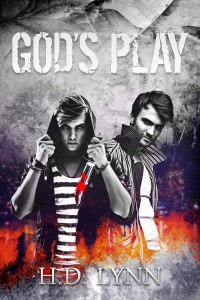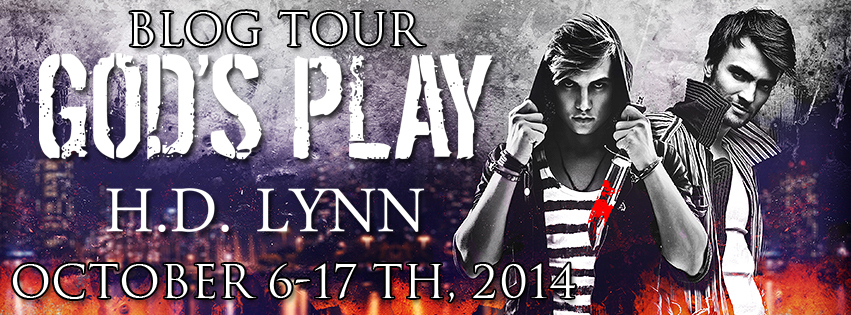- No one can teach you your voice.
I started writing when I was six (books about talking horses if you must know). One thing about six year olds you notice is that they do things (pick their nose, play in the sand, color on walls) because they find them interesting enough to capture their short attention spans. I made picture books because I liked reading picture books. No one was teaching me how to do that.
To put your mind at ease, I’ll let you know that God’s Play is not a picture book about talking horses. It does have one thing in common: no one taught me how to write those characters. I didn’t take a class on how to write Toby’s POV. There’s no Ph.D. in storytelling because humans have been telling stories to each other probably as long as our brains have been capable of doing so. After inventing the alphabet, humans literally started writing fiction.
My point is, if you can read and write, you can tell a story.
But a good story? Yeah, that’s the question I know you’ve asked yourself because I ask myself that same question all the time, too. Is it good? That’s a bit subjective, but part of good storytelling comes from practice. You’ve just got to go for it and tell yourself as many stories as possible. Silly stories. Sad stories. Salubrious stories. Anything, really, to get an idea of what you—yes, you—want to say.
- But you can certainly learn everything else.
Horses to God’s Play happened because I went to school. That’s the simple part that would’ve been staggeringly difficult if I was born in a different time or even a different place. A good, basic education in writing coherently is something valuable, and I really did learn most of what I needed to write when I was young (start humming The Killers here). I learned how to grammar and (kind of) spell. I read a lot, so I learned some little tricks they don’t teach in 7th grade English. (I had a very good 7th grade English teacher, so I learned plenty there, too.) The greatest leap in my writing style came fairly recently, though, after taking style, rhetoric, and editing classes. Thinking like an editor helped me organize what I was writing and kept me on track during early drafts.
Then, there’s this mysterious business of publishing. The Age of the Internet is upon us, and that makes finding just about anything you want to know possible. There are a lot of writers online, and if you’re reading this, you might be a writer, too. There’s nothing particularly anomalous about how God’s Play got published. I wasn’t taping rejection letters to my wall (most agents and publishers only accept emails anyway), and I didn’t come anywhere close to making this list. I did keep an excel spread sheet of everyone I’d ever sent a query to with some basic contact info and what I’d sent them; this simple system carried over for full requests as well. This is the ‘one page outline’ of organization strategies, both of which were essential to getting God’s Play written and published.
That’s right: the internet, a typing program, a non-embarrassing email address, one front and back page of notebook paper, and an excel spreadsheet. That’s what you minimally need to write and submit a book.
- Check your ego.
I did leave one thing out of my ingredients list: other people! That’s because the other people involved in getting a book to publication can be anywhere from one to legions (if you count people funding Kickstarter projects). The standard Starter Pack usually includes some combination of beta readers, critique partners, agent, editor(s), cover artist, and marketer(s)/publicist(s). These people were vital in getting this book published, and I’m appreciative of everything they’ve done for me.
But there were times when I did not want to hear (or mostly read) what they were saying.
I love God’s Play—the story, the characters, it is mine. Mine, I tell you! But parts of it also belong to the people who helped me write this book, and this never would’ve happened if I didn’t have these people in my corner. So I sacked up and made revisions; deadlines weren’t phantoms haunting me from my Ethernet cables. Ego wants to make you feel good all the time. It’s your own little cheerleader, but there are times when this book needed tough love, so ego got benched.
- Schedules and rituals can be your friend and your enemy.
A lot of authors have writing rituals. A favorite coffee shop, a special desk, a magical jig, a lucky desk troll—you get the idea. I’m pretty ritual free, and that’s been a bit of a curse for me, especially during that nebulous time called ‘the weekend.’ I can just stay in bed all day! This is when I do go to aforementioned favorite coffee shop and do my magical jig (they haven’t kicked me out…yet).
That said, I’ve often felt hamstringed by rituals. They’re for, like, adults and serious people. A story needs room to breathe. God’s Play started out under a different title; the story was supposed to be novella length. It was a radically different book, and about 40,000 words in, I knew it was going to be a different story than I’d originally thought. So there was rewriting and outlining…and then the story sat. For months. (That’s like writing negative words and losing NaNo.) Then, one a snowy weekend, I sat down and finished the book (35,000 words) in three days. Later drafts made it a bit longer, but that’s how the initial rough draft got completed. It was insane, but it worked for this novel—for me. So don’t get hung up on your 1,653 words a day—just write. Or don’t.
- You better be having a blast.
I had a great time writing God’s Play. Seriously, divide 35,000 by 3. If you’re writing ~12,000 words a day, you’re hooked on something (writing and pomegranate green tea). I came back to God’s Play because I believed in this story—there was something about it that was intuitive, living in my subconscious. The ending was there, I just needed to take that leap and slot as much of the plot into place in the first draft as possible. That was fun.
And thank god because editing can be tedious. I loved this story, but you better believe there were times I questioned whether I wanted to publish this book. That nifty excel spreadsheet started to feel like a wall of shame at some point, and I wondered how many revisions I’d need to do before this thing was ready or if it would ever truly be publishable. There’s a lot of self-doubt involved, and it’s only the memory of that hot-n-heavy passion I had with this story that kept me working. I couldn’t betray this book, so I kept working.
And this part? This part is amazing. I found new energy for writing since I looked at the book cover for God’s Play. So keep on keeping on, and enjoy the book excerpt!
 Amazon US | Amazon UK | Barnes & Noble | Kobo | Goodreads |
Amazon US | Amazon UK | Barnes & Noble | Kobo | Goodreads |
Description:
Sixteen-year old Toby was trained by a family of hunters to kill shape-shifters — but he has a unique weapon in his arsenal. With a touch of his hand, Toby can lift the magical protection shape-shifters use to disguise themselves as human. It’s an unusual skill for a hunter, and he prefers to kill monsters the old-fashioned way: with a blade.
Because of his special skill, Toby suspects he may be a monster himself. His suspicions deepen when William, a jackal-headed shape-shifter, saves him from an ambush where Toby’s the only survivor. And Toby doubts William helped him for purely altruistic reasons. With his list of allies running thin, Toby must reconcile his hatred of shifters and the damning truth that one saved his life. It’ll take both of them to track down the monster who ordered the ambush.
And Toby needs his unlikely alley because he has a vicious enemy — the infamous Circe, who has a vendetta to settle against the hunters. Toby has to unravel the mystery of his dual nature. And he has to do it on the run — before Circe finds him and twists him to her own ends.
—
H.D. Lynn is like Harry Potter in one way: she’s currently renting an apartment with a bedroom under her building’s stairs. Other than this, she explores fantasy worlds through storytelling like anyone else. She loves books with a mix of humor, adventure, and horror, and especially enjoys the urban fantasy genre. GOD’S PLAY is her first published novel.
When not writing, she enjoys hiking, climbing, and running. She’s a voracious reader, and has found listening to audiobooks while backpacking to be a perfect mix of two of her favorite things. She currently lives in Connecticut, but finds herself on the road often.



0 Comments